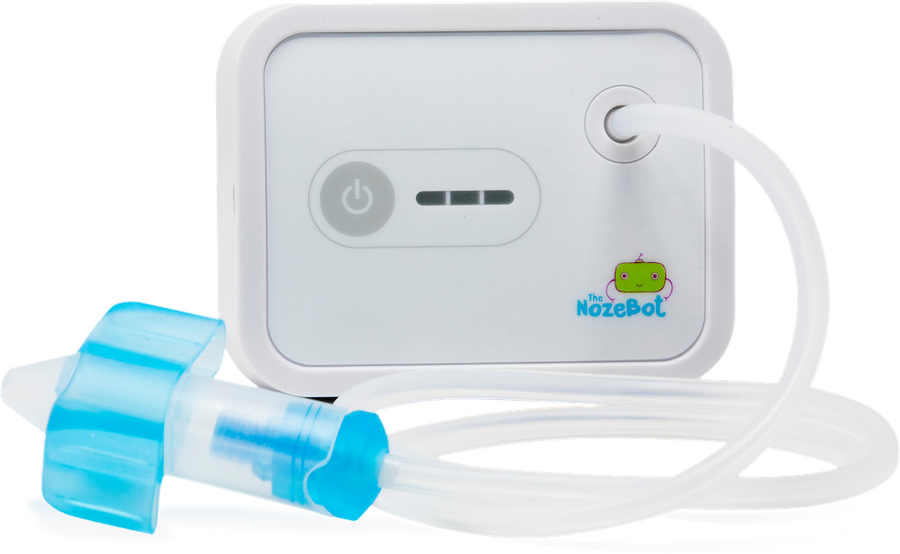Guest Post by Katy Fleming, MA, LPC, BSN, RN
When your little one has their first runny nose, cough, or fever, you may not know how to help best.
Babies catch approximately six colds by age one as their immune system develops. Between sleepless nights of coughing and fussy feedings, cold and flu season is often overwhelming for parents of young children.
Learn more about symptoms to expect and treatment to stay prepared for your baby’s first cold.
How to Prepare for Your Baby's First Cold

Exhausting for both the parent and the little one, babies typically fight sickness once the first cold and flu season arrives.
Get ready for your baby’s first cold with these prevention and treatment tips.
Cold Symptoms in Babies
Signs and symptoms of illness may appear differently in babies. Your older children verbalize that they’re in pain, however, it’s important to look for signs of distress in our younger kiddos.
Newborn babies haven’t fully developed their immune system yet, and any illness is a potential threat. For babies exhibiting cold symptoms under 3 months of age, call your pediatrician’s office for further recommendations.
Cold symptoms in babies include:
- Runny nose
- Stuffy nose
- Cough
- Sneezing
- Reduced appetite
- Poor sleep
- Fussiness
- Difficulty feeding
- Fever (100.4°F or higher)
Causes
Hundreds of viruses cause the common cold, also known as an upper respiratory infection.
A blood test can rule out bacterial infections, and nasal swabs can help determine the type of infection.
Since the common cold is caused by viruses, it does not respond to antibiotics.
Viruses are spread by direct contact with others, through the air, or touching a contaminated surface.
For babies, these germs are often shared when playing with a toy or coming into close contact with a sick friend or family member.
Treatment
Although the common cold doesn’t have a cure, you can lessen your baby’s symptoms at home. Keep these in mind to ease your baby’s discomfort.
- Suction their stuffy nose with a nasal aspirator. The NozeBot is an electric, hospital-grade suction created by a pediatric ENT to gently, yet powerfully suction out snot.

- Keep your baby hydrated with breast milk or formula.
- Wipe away those unwanted boogies with a quick Noze Wipe. Made with Aloe, Chamomile, and Vitamin E, these durable wipes soothe your baby’s snotty nose.
- Use a cool-air humidifier to keep the air moist. Dry air thickens nasal mucus making it harder for your little one to breathe.
Never give your infant any medication without speaking to their pediatrician first. Babies don’t develop the ability to breathe out of their mouth until 3 or 4 months of age. It is essential to help your infant breathe effectively when fighting cold by cleaning out their tiny noses.
Prevention
Babies are bound to develop a cold at some point, but minimize the likelihood of serious sickness with these preventative measures.
Frequent Handwashing
Always wash your hands before touching your baby. When friends and family visit, ask that they also wash their hands. Teach older siblings about hand hygiene, too. Hand sanitizer is helpful in quick moments when a sink isn’t available.
Up-To-Date Vaccinations
Remain on schedule not only for your infant’s recommended vaccinations but also for your vaccinations. Speak to your medical provider about important vaccines such as RSV. The flu and RSV are potentially life-threatening in little ones. Protect your entire family with immunizations.
Ask Sick Friends to Stay Home
It’s hard to resist that new baby smell, however, sick family and friends need to stay home. Avoid contact with people who are not feeling well and keep sick family members away from your baby.
Disinfect High-Touched Areas
Minimize germs by regularly disinfecting highly touched surfaces such as door knobs, toys, and light switches. Keep some wipes in your purse or diaper bag to clean surfaces on the go, as well.
When to Call the Doctor

It’s vital to call the doctor if your infant under 3 months old experiences any cold symptoms, including a fever. No matter your baby’s age, call the pediatrician’s office if the following occurs:
- Your child has difficulty breathing.
- Their fever (100.4°F or higher) lasts longer than three days.
- Tugging at their ears
- Your infant stops reacting or appears bluish
- Vomiting, diarrhea, or a rash appears
If your little one’s symptoms worsen or you suspect something is off, call your pediatrician for further guidance.
Want more tips for your baby? You’ll love these:
- The Ultimate Guide to Car Seat Safety
- Nosebleeds 101: What Parents Need to Know
- 8 Reasons to Visit the ENT That Most Parents Overlook
- Productivity Hacks for Work-at-Home Moms With a New Baby
- What are Nasal Aspirators? And How Can They Help My Baby?
Most colds are mild in babies, but complications can occur, such as ear infections or pneumonia. Keep your infant hydrated and monitor their symptoms.
Your little one’s pediatrician will happily answer any questions, provide recommendations, and guide you through your baby’s first cold.
The Nozebot is a battery-powered suction device designed to clear nasal congestion in babies and children.


